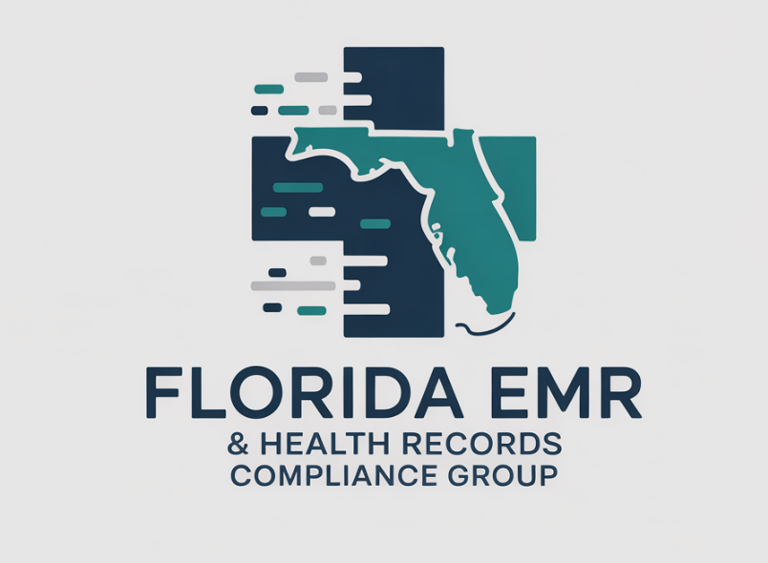Florida healthcare providers ensure your EMR meets state compliance and security standards with our $39.99 self-assessment.
Florida’s Offshore EHR Storage Ban: What Your Clinic Needs to Know
Learn what Florida’s new EHR offshore data storage ban means for your practice. This article explains the updated requirements under Florida Statute 408.051(3), who the law applies to, and how healthcare providers can verify vendor compliance. Discover how to protect patient data, avoid compliance risks, and meet Florida’s new standards for EMR and EHR storage with confidence.
5/8/20244 min read


Florida’s Offshore EHR Storage Ban: What Your Clinic Needs to Know
Florida has taken a decisive step to strengthen patient privacy and data security through a new rule that every healthcare provider should understand. The amendment to Florida Statute 408.051(3) now prohibits storing or accessing electronic health records from outside the United States, its territories, or Canada.
This means that any healthcare organization using an electronic health record (EHR) or electronic medical record (EMR) system must verify exactly where their patient information is stored and who can access it. If your vendor relies on servers, contractors, or support teams located overseas, your practice may no longer be compliant.
Why Florida Changed the Law
The Florida Legislature introduced this offshore storage ban to reduce the risk of unauthorized access to patient information by foreign entities. The goal is simple: keep sensitive health data within secure jurisdictions that follow U.S. privacy standards.
The law also aims to close loopholes in cloud computing and subcontractor relationships. In the past, many healthcare practices used EHR vendors that outsourced technical services or storage to other countries. While these practices might have been convenient, they also created potential exposure to data breaches and privacy violations.
Under the new Florida rule, this is no longer acceptable. Even if your EHR data is hosted in the United States, you must confirm that no one outside of the country or Canada can access that information, even temporarily.
Who the Law Applies To
The offshore storage restriction applies to a wide range of Florida healthcare professionals and organizations. This includes physicians, behavioral health providers, dentists, pharmacists, home health agencies, clinics, nursing homes, and any entity using certified electronic health record technology.
It also extends to administrative and technical staff who have the ability to access or manage patient data. Essentially, if your system contains patient information — from demographics to diagnoses — this law applies to you.
What the Law Requires
The core of the requirement is simple but strict. Healthcare providers must ensure that any patient record stored or accessed electronically remains within the U.S., its territories, or Canada. This applies to your own systems as well as any cloud services, subcontractors, or third-party vendors that handle your data.
Providers must also sign an affidavit confirming compliance under penalty of perjury. The Florida Agency for Health Care Administration (AHCA) is empowered to investigate violations and take action against providers who fail to meet these requirements.
Why It Matters to Behavioral Health and Private Practices
For behavioral health organizations and private practices, this law carries significant implications. Many small and midsized practices rely on third-party EHR vendors, often unaware of where those vendors store data. A single oversight — like an offshore backup or a foreign technical support team — could lead to compliance violations.
The reputational damage from a compliance failure can be severe. Patients expect their records to remain private, and breaches can erode trust, invite audits, and risk penalties.
How to Protect Your Practice
The best way to safeguard your organization is through documentation and verification. You should:
Identify every location where your EHR vendor stores data — including production servers, backup servers, mirror sites, and test environments.
Confirm the geographic region of each data center and ensure none are located outside the U.S., its territories, or Canada.
Request an affidavit or signed letter from your vendor confirming full compliance with Florida Statute 408.051(3).
Ask whether any data storage or access occurs through international cloud zones, particularly in Europe or Asia, which could violate Florida’s restrictions.
Verify encryption methods and data transfer protocols used by your vendor to ensure they meet HIPAA and state-level encryption standards.
Request documentation of the vendor’s data redundancy and disaster recovery policies, confirming that all backups are stored domestically.
Evaluate the vendor’s breach response plan to confirm that offshore contractors are not included in post-incident data recovery or analysis.
Ensure any remote technical support provided by the vendor originates from within the United States or Canada.
Ask to see proof of the vendor’s SOC 2 or equivalent audit certification, with attention to data location and access control.
Review the vendor’s Business Associate Agreement (BAA) and confirm that it includes explicit geographic restrictions.
Validate that your vendor’s hosting provider (e.g., AWS, Microsoft Azure, Google Cloud) is using U.S.-based regions exclusively.
Audit your own contracts to ensure you are not indirectly granting access to offshore entities through integrations, plugins, or outsourced billing systems.
Document every correspondence and response in case you are ever investigated by the Florida Agency for Health Care Administration (AHCA).
Create an internal compliance log showing all verification steps, dates, and signatures — and maintain it for audit readiness.
Conduct annual re-verification since vendors often change hosting partners or subcontractors without notifying clients.
Design and distribute internal policies to staff specifying that patient information cannot be transmitted, accessed, or supported from outside the U.S. or Canada.
Train all clinical and administrative staff on data access boundaries to prevent accidental offshore transmission during telehealth or remote sessions.
Ensure all vendor API connections (including billing, scheduling, and patient portal integrations) comply with the same geographic restrictions.
Create contingency plans in case your vendor is found non-compliant — including how you would migrate data and notify patients if necessary.
Maintain legal documentation proving due diligence for future inspections, renewals, or disciplinary reviews.
Cross-reference your findings with HIPAA, HITECH, and state-specific requirements to avoid conflicting interpretations.
Reassess your EMR vendor annually to maintain continuous compliance as new laws and technology changes occur. At Florida EMR & Health Records Compliance Group, we simplify this process. Our Self-Service Compliance Assessment allows providers to send a structured compliance form to their EHR vendors for only 39.99. The vendor must complete the assessment, helping you confirm where and how your data is stored.
For a more comprehensive review, our Full EMR Compliance Assessment priced at 350.00 involves a detailed evaluation by our compliance experts. We analyze vendor responses, identify potential gaps, and provide a written summary aligned with Florida’s statute and health information governance standards.
Taking the Next Step
Compliance is not just a legal requirement — it is a professional responsibility. Demonstrating that your organization has verified its data storage practices protects your license, your patients, and your reputation.
Florida’s new EHR storage rule sets a clear standard for healthcare data integrity. Providers who take proactive steps now will be positioned for smoother renewals, fewer risks, and stronger trust from patients and regulators alike.
If you have not yet confirmed your vendor’s compliance, now is the time. Visit floridahealthrecordscompliance.com to begin your assessment today.
We provide EMR compliance assessments, vendor documentation tools, and full support for Florida healthcare providers.
Phone
© 2025. All rights reserved.
